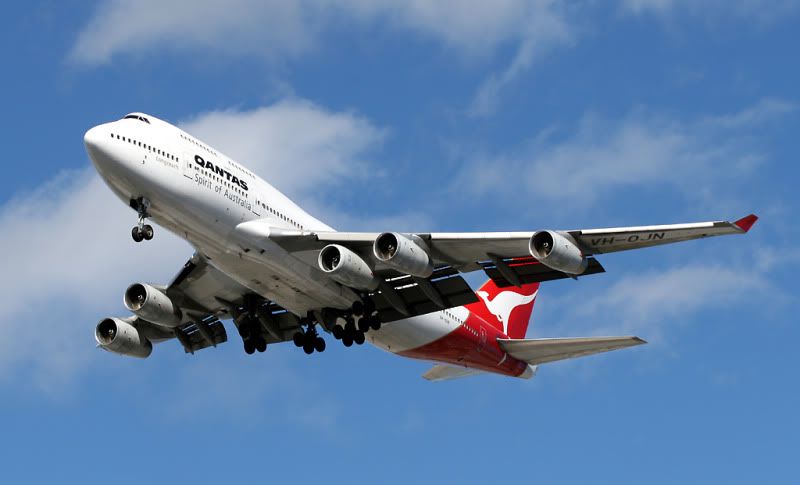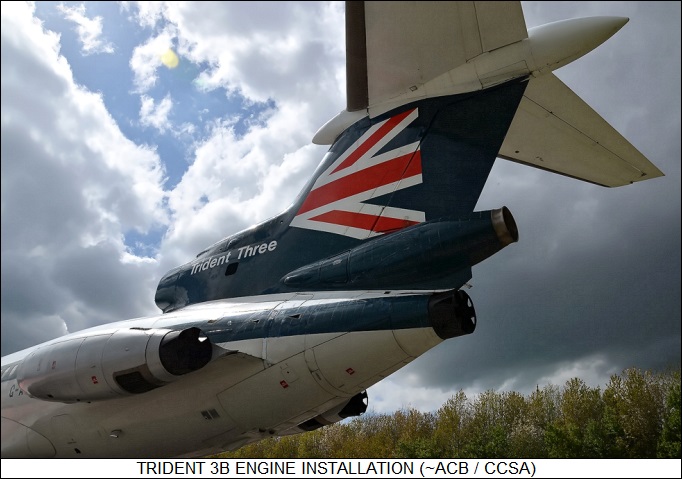
tuna55
MegaDork
3/21/17 11:10 a.m.
My axioms:
1: Four engined airplanes are usually designed for over twin engined airplanes because of increased reliability, not added thrust
2: Twin engines are cheaper to operate (A380 article)
3: Modern gas turbines are pretty awesomely reliable and can start up rather quickly if needed
Has there ever been a design where an airplane carried an extra engine which wasn't normally used? Just like a spare on board? Or have designers just designed for thrust loads split between the engines, with the requirement that the plane can fly to some degree with X engines not running?

Ian F
MegaDork
3/21/17 11:20 a.m.
With weight being such an enemy in aircraft design, I can't imagine designers adding an engine just in case it might be needed. Besides, it's usually better to have all engines running under-stressed than stressing a few needlessly.
I do recall reading many multi-engine military aircraft are often designed so they can still fly with some number of engines not functioning. I've read of B52's still flying with at least 4 of the 8 not running.
Rutan's Voyager was designed to only use both engines on take off at full, gross weight, and in the event of an emergency such as storm avoidance. The front engine was shut down most of the flight.
I'll take a stab at this. I'm not in the business, but I do have aviators in my bloodline going back to the dawn of powered flight.
I seem to recall a documentary about the DC3 in which one of it's big public tests was crossing the Rockies on one engine, so redundancy and load sharing were concepts that were already in place by the 1930s.
No relatively modern air craft would have an auxiliary engine for the purpose of thrust. I'm sure the reasoning is that it unneeded extra wieght and drag, and if your not confident enough in the engines making the trip, you need better engines. Some have Aux Power Units "APUs" for powering onboard systems separate from main engines.
A spare main engine sounds positively Soviet
North America's AJ Savage had a jet buried in the tail used for bursts of speed over the target, same for jets buried in each nacelle of Martin's Mercater
HappyAndy wrote:
Some have Aux Power Units "APUs" for powering onboard systems separate from main engines.
All but the smallest planes do. It's a small centrifugal turbine engine, usually in the tail. That's what the little exhaust outlet on the tail of airliners is for.

Javelin
MegaDork
3/21/17 11:54 a.m.
I don't know about planes, but the 378' USCG Cutters have 2 jet engines buried in their bowels that were designed for use on high-speed intercepts. These days they are used to limp them back home when the diesel main engines fail. 
Didn't the Russian Eraknoplane design have spare engines? Or maybe they were for thrust.

pres589
PowerDork
3/21/17 11:54 a.m.
Some airliners use normal jet engines as an APU and not the small turbo-like setup previously mentioned. When turbine engines get to a certain size, they're very hard to start with an electric starter, and they move to using bleed air off of the APU to spin up the real engines. APU's are a nice way to provide air conditioning without running the main engines.
Convair had that bonkers B-36 which eventually gained jet engines in addition to the piston radial engines that pushed the thing. In flight the jets would normally be turned off. Ref: https://en.wikipedia.org/wiki/Convair_B-36_Peacemaker#Addition_of_jet_propulsion
They aren't engines, but a ram-air turbine, or RAT, is kind of like what you're talking about. It's basically a wind driven generator and it runs in an aircraft airstream. Useful on drone attachments, where the carrier drone doesn't provide much electrical power to a carried pod of equipment.
I think there used to be a rule that you had to have more that two engines to be a transoceanic airliner. Thus, the L-1011 had three.

tuna55
MegaDork
3/21/17 11:59 a.m.
Just for clarity, I am not advocating this as a good idea, I was just curious.
As it seems, there are a few examples where some of that actually made it to the air in various forms.
Interesting.

NickD
SuperDork
3/21/17 12:07 p.m.
Well, the old Convair B-36 Peacemaker had pods designed to go on the underside of the wing that would have carried spare engines because the R-4360s were so prone to failure (due to being mounted in a pusher configuration) and catching fire. There's no records of those pods ever being used, but the problem was common enough that the slogan "six burning, four turning", referring to the six jet engines and 4 prop engines, became two turning, two burning, two smoking, two choking, and two more unaccounted for."
The reasons above are why multi-engine aircraft. I grew up around aircraft maintenance and am an aircraft mechanic, or was one. Load sharing redundancy is why there is more than one. Maintaining flight during a rare engine failure. APU's are to run basic systems for start, usually. Some exceptions but not common.
I know of no instance where a spare engine is just there for just in case. The Super Jolly Giant CH-53E (I think) helicopter has 3 engines, 1 used for heavy loads. The old C-119 Flying Boxcar when it hit the civilian market often had a JATO on top. Jet Assist Take Off only used on take offs and even then it looks like it won't get off the ground. Dad was a flight engineer on one in the air force.
You mean like this? "Wasn't normally used" includes external cargo right?

Qantas explaining why...

codrus
SuperDork
3/21/17 12:37 p.m.
It depends on what you mean by "just in case". In a sense, since all civilian multi-enigned aircraft are required to be able to take off with one engine dead (at least, once they reach the speed where it's no longer safe to abort the takeoff), all of those engines are "just in case". They're always going to be turned on at takeoff, though, because halfway down the runway doing 150 knots is a bad time to try to start your backup engine. :)
Other oddball cases include motor-gliders, which are mainly used as zero-engine aircraft but have an engine that can be used to extend flights, to avoid the need to wait/pay for a tow aircraft, and for emergencies.
Then there was the NB36-H, which was a test plane working towards developing a nuclear-powered aircraft. They put a functioning nuclear reactor in the back of the bomber -- not connected to anything yet, but just to see how it would work. 11 tons of shielding for the crew...
I've read (and seen pics of) that the P3C Orions would turn off one engine while on patrol to save fuel.

tuna55
MegaDork
3/21/17 12:47 p.m.
Cool!
Airplanes are weird.
Loving these neato examples.
I think the closest to that is the Ryan Fireball (probably a poor name choice):

I am not sure if they shut down the jet for cruise. Probably a good idea though with how thirsty those old engines were.
Prop in front, party in the back:

Also know as the first jet powered plane to land on an aircraft carrier when the piston engine failed and it landed on jet only.
HappyAndy wrote:
A spare main engine sounds positively Soviet
Soviet deign philosophy would be to add a spare engine's worth of weight to the main engines to improve their reliability.
Dr. Hess wrote:
I've read (and seen pics of) that the P3C Orions would turn off one engine while on patrol to save fuel.
I am a bit surprised they don't cut two of them. There are a number of pics of this though, so it must be rather common:

The Trident 3B was a triple engine jet like the 727 that had a fourth "booster" engine in the tail for use during takeoff.
I remember being told that the engine used a total loss lubrication system and had no real controls other than on and off.
Edit-- found a pic

Thrust wise, the way things generally work out is that a four engine jet aircraft has 4/3rds the power needed for takeoff, a three engine aircraft has 3 halves the power, and a twin has 2 times. So a twin would have the most power available for an all engine takeoff.
Turboprops work a little differently, but the Dash 8-400 had it's engines sized for speed at cruise, which resulted in the aircraft having astounding low speed performance-- at low altitude, it had a hole shot like a ski boat.
While I was at Boeing during the development of the 777-300, one of the alternatives being studied was using a "thrusting APU" that would essentially be an F404 or 414 from an F18 that would provide around 15,000 lbs thrust in addition to serving all the functions of the APU. It would have let the aircraft use 2 100,000 lb thrust engines instead of 2 115,000 lb thrust engines, which opened up the engine choices a fair bit.
Like the Trident, there would have been no dedicated power lever-- it would just move into thrust mode once the power levers were put into the takeoff position.
And as one last bit of trivia, the APU on the 747-400 is essentially the same machinery as the engine on the Lear 60, just converted to provided electrical power and compressed air.
In reply to Karacticus:
Could I get one of those APU's to run my house and shop air? That would be cool....
Dr. Hess wrote:
In reply to Karacticus:
Could I get one of those APU's to run my house and shop air? That would be cool....
Can I get one to spool my turbo?
I give up trying to embed the bloody video.
Dr. Hess wrote:
In reply to Karacticus:
Could I get one of those APU's to run my house and shop air? That would be cool....
You could have God's own HVLP paint set up!
But if you have any neighbors that currently complain about noise....
Also, Whatever you have now is likely much more robust-- they really don't like it if run things through them like plastic shopping bags.
WonkoTheSane wrote:
Dr. Hess wrote:
In reply to Karacticus:
Could I get one of those APU's to run my house and shop air? That would be cool....
Can I get one to spool my turbo?
I give up trying to embed the bloody video.
https://www.youtube.com/embed/6EMleegZQLw













































